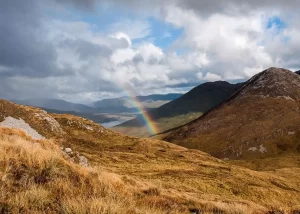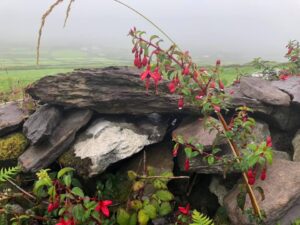Fr Seán Mc Donagh, in the introduction to his book ‘The Death of Life’ (2004) reminds us ‘that most scientists and well-informed people throughout the world now acknowledge that human activity has altered, in a substantial way, the living systems of planet Earth, especially in recent decades.’
Recent decades have also seen a revival of interest in Celtic and Medieval literature based on the mythology of the past. Much of it resonates with the ‘New Story’ of Thomas Berry, which is based on the scientific evolutionary story. Thomas Berry, in his efforts to raise our awareness of the damage we are inflicting on our home planet, focuses on our oneness with the natural world and the sacredness of all life. This New Story is also ‘the product of thousands of years of human curiosity, observation, experimentation and creativity’ (Chet Raymo).
In Irish mythology the Milesians, who came from Spain, threatened the race of Irish gods known as the Tuatha Dé Danann, and eventually forced them under ground, into old burial mounds. The Milesians then became the ancestors of the Celts in Ireland.
One of the first Milesian sailors who was a poet and prince, named Amergin, stepped from the boat on his arrival in Ireland, placed his right hand on the shore and wrote this song, which is still alive among singers and poets –

Tradition tells us that the poem, handed down by generations in the oral tradition, was most likely written for the first time in the 6th or 7th century, possibly by medieval monks. Despite much discussion by scholars the meaning of this apparently simple poem remains elusive. It does, however, give expression to the interconnectedness and the ‘at oneness’ with the natural world/the gods as experienced in the spirituality/mythology of earlier generations of humans. In our generation we are gradually recovering this sense of the oneness of all life which is so urgent for our planet’s wellbeing, and ultimately also for our own human wellbeing.
Chet Raymo, an American Scientist, while out cycling one day in West Kerry, Ireland, stopped to rest at a hedgerow suddenly realized that he was sitting in a place of exceptional botanical riches, a wild garden, and wrote:
‘Silently, out of time, I recited a litany that might have been Amergins: Fuchsia. Foxglove. Loosestrife. Bramble Rose. Tick Trefoil. Vetch. Clouds tumbled off the Atlantic. Shadows raced along the tarmac. A few raindrops fell on my upturned face. Without any human form of speech my heart had articulated a prayer to the hidden God.’


Reminded me of one beautiful summer day spent wandering among the remains of a Celtic monastery in Kerry with a knowledgable cousin.
This article rattled my irish heart. Thanks E.M.
Sending a touch of gratitude across the pond from one land to another. You reflection and pictures left a ‘spark’ in my spirit.
Go raibh mile maith agaibh.
The fuchsia takes me back to the lovely wild hedgerows of my childhood which I have come to appreciate at a deeper level with the passage of time. Thank you for reminding us that nature speaks in silence
Thank you for this lovely and peaceful and prayerful breeze from Ireland 🍀
Many thanks! Sr Dominic Savio CP.